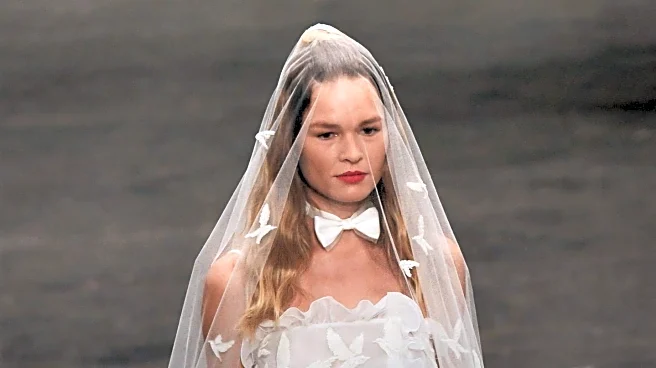What's Happening?
Paris Fashion Week has sparked significant debate over the fashion industry's understanding of women's needs, as many collections appeared disconnected from practical wearability. Critics have pointed out that the balance between fantasy and function, traditionally a hallmark of Paris Fashion Week, faltered this year. Notable designers like Pieter Mulier for Alaïa and Glenn Martens for Maison Margiela presented avant-garde pieces that raised questions about their practicality and relevance to everyday women's fashion. The lack of body diversity on the runways further fueled criticism, with some collections perceived as confining or erasing the women beneath the garments. This has reignited discussions about the industry's approach to female consumers, particularly given the predominance of male leadership in major fashion houses.
Why It's Important?
The criticism highlights a broader issue within the fashion industry regarding its alignment with consumer needs, especially women. As fashion brands struggle with lagging sales, the disconnect between runway spectacle and practical clothing could impact their commercial success. The industry faces pressure to balance creative novelty with wearability, as female-led brands known for versatile pieces gain popularity. This situation underscores the importance of understanding consumer preferences to drive sales growth. The debate also touches on gender dynamics within the industry, with male-dominated leadership potentially influencing design choices that may not resonate with female customers.
What's Next?
Fashion brands may need to reassess their design strategies to better align with consumer expectations, focusing on wearability and practicality. As runway shows increasingly serve as marketing exercises, designers might face pressure to innovate while ensuring their collections appeal to everyday consumers. The industry could see shifts in leadership dynamics, with potential calls for more female representation in creative roles. Brands that successfully balance fantasy with function could gain a competitive edge, driving sales and consumer loyalty. The ongoing discourse may also influence future fashion weeks, prompting designers to consider the real-world implications of their creations.
Beyond the Headlines
The criticism of Paris Fashion Week reflects deeper cultural and ethical considerations within the fashion industry. The lack of body diversity and perceived sexism in design choices raise questions about inclusivity and representation. As the industry grapples with these issues, there may be increased scrutiny on how fashion brands address consumer needs and societal expectations. The debate could lead to broader discussions about the role of fashion in shaping cultural narratives and its responsibility to reflect diverse identities and experiences.











